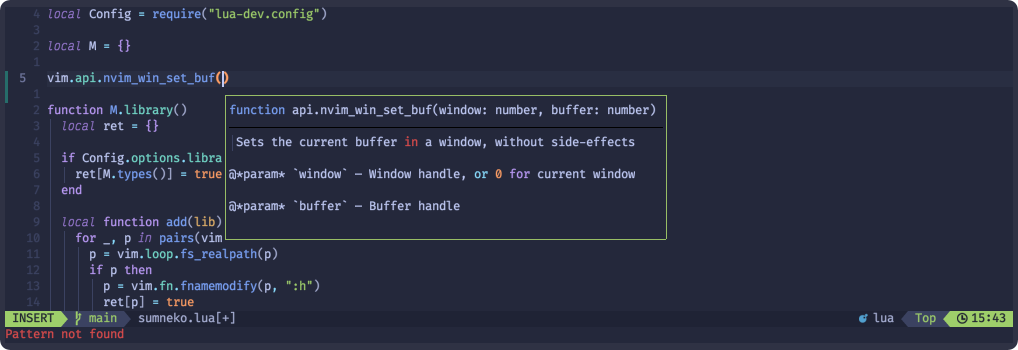*lua-dev.txt* For NVIM v0.5.0 Last change: 2022 October 14
==============================================================================
Table of Contents *lua-dev-table-of-contents*
1. lua-dev |lua-dev-lua-dev|
- Features |lua-dev-features|
- Requirements |lua-dev-requirements|
- Installation |lua-dev-installation|
- Configuration |lua-dev-configuration|
- Setup |lua-dev-setup|
- How? |lua-dev-how?|
==============================================================================
1. lua-dev *lua-dev-lua-dev*
Dev setup for init.lua and plugin development with full signature help, docs
and completion for the nvim lua API.
FEATURES *lua-dev-features*
- Automatically configures **lua-language-server** for your **Neovim** config, **Neovim** runtime and plugin
directories
- Annotations for completion, hover and signatures of:
- Vim functions
- Neovim api functions
- `vim.opt`
- vim.loop
- properly configures the `require` path.
- adds all plugins in `opt` and `start` to the workspace so you get completion
for all installed plugins
- properly configure the vim runtime
REQUIREMENTS *lua-dev-requirements*
- Neovim >= 0.7.0
- completion plugin like nvim-cmp
INSTALLATION *lua-dev-installation*
Install the plugin with your preferred package manager:
PACKER ~
>
use "folke/lua-dev.nvim"
<
VIM-PLUG ~
>
Plug 'folke/lua-dev.nvim'
<
CONFIGURATION *lua-dev-configuration*
**lua-dev** comes with the following defaults:
>
{
library = {
enabled = true, -- when not enabled, lua-dev will not change any settings to the LSP server
-- these settings will be used for your Neovim config directory
runtime = true, -- runtime path
types = true, -- full signature, docs and completion of vim.api, vim.treesitter, vim.lsp and others
plugins = true, -- installed opt or start plugins in packpath
-- you can also specify the list of plugins to make available as a workspace library
-- plugins = { "nvim-treesitter", "plenary.nvim", "telescope.nvim" },
},
setup_jsonls = true, -- configures jsonls to provide completion for project specific .luarc.json files
-- for your Neovim config directory, the config.library settings will be used as is
-- for plugin directories (root_dirs having a /lua directory), config.library.plugins will be disabled
-- for any other directory, config.library.enabled will be set to false
override = function(root_dir, options) end,
}
<
SETUP *lua-dev-setup*
**lua-dev** will **ONLY** change the **lua_ls** settings for:
- your Neovim config directory
- your Neovim runtime directory
- any plugin directory (this is an lsp root_dir that contains a `/lua`
directory)
For any other `root_dir`, **lua-dev** will **NOT** change any settings.
>
-- IMPORTANT: make sure to setup lua-dev BEFORE lspconfig
require("lua-dev").setup({
-- add any options here, or leave empty to use the default settings
})
-- then setup your lsp server as usual
local lspconfig = require('lspconfig')
-- example to setup sumneko and enable call snippets
lspconfig.lua_ls.setup({
settings = {
Lua = {
completion = {
callSnippet = "Replace"
}
}
}
})
<
Example for setting up **lua-dev** that overrides the settings for `/etc/nixos`
>
-- You can override the default detection using the override function
-- EXAMPLE: If you want a certain directory to be configured differently, you can override its settings
require("lua-dev").setup({
override = function(root_dir, library)
if require("lua-dev.util").has_file(root_dir, "/etc/nixos") then
library.enabled = true
library.plugins = true
end
end,
})
<
HOW? *lua-dev-how?*
**Neovim** includes a script
to
generate the nvim docs. That script also creates message pack files containing
all the API metadata in a structured way. Unfortunately these files are not
packaged in the releases.
Using the message pack files, I converted all the API data to EmmyLua
annotations
and
make them available for the Sumneko LSP
as a workspace library.
Generated by panvimdoc
vim:tw=78:ts=8:noet:ft=help:norl:


